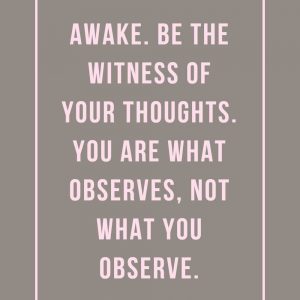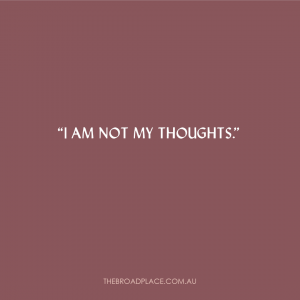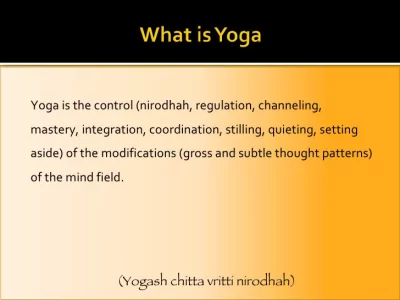
In the Yoga Sutras, the phrase Chitta vritti describes how our minds tend to flit about from one thought to the next. You may know this term as “monkey mind” or “mind chatter.”
Our mind chatter affects the quality of our lives like ripples in a pond affects the water’s surface. The mind, just like the pond, is calm and still in its natural state. But our thoughts are like rocks thrown into the pond. The more thoughts we have, the rougher the water becomes, and the less clear we become about who we are.
So Who Are We Really?

We are the witness watching our mind chatter while sitting on the edge of the pond. From this vantage point, we can see our thoughts, or ‘ripples’, for what they are. Just thoughts. We are not our thoughts- but we have thoughts. They are vast, unusual, imaginative, intense, untrue, and dismissive, but they are not who we are.
Our mind chatter does not control us. Instead, we, as the witness, have the power to direct our chitta vrittis to help support us in all aspects of our lives.
Being a Witness of My Vrittis

According to author Michael Singer, “There is nothing more important to true growth than realizing that you are not the voice of the mind – you are the one who hears it.”
We tend to forget we are the witness of our thoughts because so many of them are on autopilot. When we think a thought so many times, we don’t even recognize it as a thought anymore. We lose control over our thoughts when we aren’t aware of them. Then our monkey minds have the power to control us without us even knowing it.
At a fairly young age, my mind started to have a lot of thoughts about food. Many of these thoughts were influenced by unattainable societal norms. I think my mind began to categorize food as “good” or “bad” as a solution to help simplify these thoughts. Unfortunately, this black and white thinking around food resulted in a constant battle between my body and mind every time I ate something. If I believed I ate ‘badly’ that day, I often criticized, shamed, and belittled myself. On the flip side, if I believed I ate food that my mind classified as ‘good’ then somehow I was left feeling depleted, unsatisfied, and uneasy.
Eating is necessary for survival. It sustains our life and allows us to thrive. At the time, I didn’t believe any of this about food. My mind just didn’t see it that way.
Instead, I believed food was the enemy. I lived in some pretty turbulent waters and a constant state of anxiety about food. Physically, I also suffered. I was perpetually low on energy and suffered from poor digestion. Somehow the scale kept going up despite my continuous effort to make it go down.
Gaining Control of My Vrittis

My Chitta vritti’s, or ‘ripples’ concerning food became so unbearable that I eventually had to stop and question absolutely everything I believed about it. This was not a comfortable or easy process but definitely, one worth doing.
I started this process by getting calm enough to observe the thoughts that flooded my brain every time I ate. I noticed I had plenty of destructive thoughts about food and very few constructive ones. I questioned many of them. Were these thoughts even true? Or were they just blurring the clarity of the pond?
My relationship with food changed once I began choosing different ‘ripples,’ or thoughts. My anxiety reduced, my body felt healthier, and I looked forward to eating. As my thoughts changed, so did my actions. I started tuning in to foods that made me feel good rather than classify food as ‘good.’ I also began learning how to cook and read books about food that would support my physical health.
Being the witness of my thoughts allowed me to develop a clearer perception of food’s purpose. I began to view it as a neutral source that had the potential to nourish my body. I began to take control over my physical health rather than allow my thoughts about food to control me.
Ripples, Vrittis, and MILKSHAKES

For years, I did not choose my thoughts about food. I borrowed them. What we tell ourselves, or think, may directly affect the physical health of our bodies.
Let’s use what is known as the “milkshake experiment” to demonstrate this. Researcher, Alia Crum, wanted to know if how we think could influence our physical response. She created an experiment with two “different” milkshakes for test subjects to drink. One was labeled as a healthy, diet drink with only 140 calories and the second was labeled as an indulgent, sugar and fat-laden, drink with 620 calories. In reality, both drinks were identical and contained 380 calories each.
The forty-six subjects in the study read the graphic and pictorial labels and created thoughts in their minds about the milkshake, just like you and I do when we buy food from the grocery store or restaurant. Half of the subjects got the “healthy diet” drink while the other half got the “sweet indulgent” shake.
Crum measured ghrelin levels of the participants before and after the study. Ghrelin is a hormone secreted in the gut, also known as the hunger hormone. When ghrelin levels rise, a signal is sent to our brains to seek out food. This signal also slows down metabolism in case you don’t find food.
After eating, blood ghrelin levels fall telling us that we are full and do not need to eat anymore. Scientists believe that ghrelin levels fluctuate based on what we eat. So if we eat a big meal, ghrelin responds one way; or if we eat a small meal, it responds another. But that’s not what Crum found during her study.
In the study, Crum discovered ghrelin levels (and thus metabolism) were affected by what the participants thought they were eating, not what they ate. Crum found that participants who drank the indulgent shake had ghrelin levels that plummeted as if they had consumed three times more calories than they actually did. The participants who drank the Sensishake had ghrelin levels that barely moved at all.
The study also found that the participants’ satisfaction was consistent with what they believed they were consuming rather than the actual nutritional value of what they consumed. The Sensishake group was more likely to be hungrier again earlier than the Indulgent Shake group simply because they thought they consumed less.
Witness The Ripples of Your Mind

What we think matters. It affects every aspect of our life, including how our physical body functions. The purpose of tuning into our thoughts is not to stop or get rid of them. The idea is to become aware of what we are thinking- to be the witness.
Being the witness allows us to notice what may be disturbing the clarity of our mind. Then, we can choose to adjust the disturbances of our mind accordingly to help influence our perceptions about food, ourselves, and life.
Intentional thought observations help me retain a calm surface of the mind. When I notice there is turbulence in my life, I know it’s time to tune into my chitta virittis. Then I can choose constructive thoughts rather than destructive ones, and I can better control my mind chatter rather than allow it to control me.
Contemplation Points:
- Write down a new thought you want to believe. You can think about the
result you want and then decide what thought would create that result, to
come up with the thought. - How would this thought feel to think and believe?
- If you believe this thought, what action will you take that you aren’t
taking now? - What result will you have from believing this new thought?
- Why don’t you believe this thought now? What are you believing instead?
My Example:
- Write down a new thought you want to believe. You can think about the
result you want and then decide what thought would create that result, to
come up with the thought. I want to have a good relationship with food. I would have to think “Food nourishes my body” to help me obtain this result. - How would this thought feel to think and believe? If I believed this thought, I would feel cared for, nourished, calm.
- If you believe this thought, what action will you take that you aren’t
taking now? I would slow down when eating, pay attention to how certain food makes me feel, try new recipes, learn about food’s nutritional value, express gratitude for the food I consume. - What result will you have from believing this new thought? I will nourish my body and develop a healthy relationship with food.
- Why don’t you believe this thought now? What are you believing instead? Food is complicated, there is only ‘good’ and ‘bad’ food, I have no control when it comes to eating, thinking about food exhausts me, I will never have a good relationship with food.







